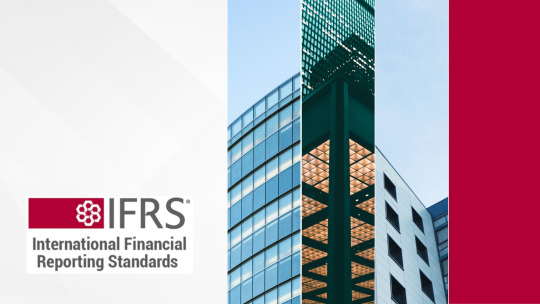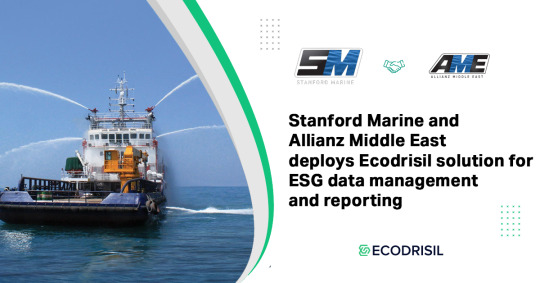#Ecodrisil
Explore tagged Tumblr posts
Text
Upcoming UAE Regulation on Climate Change

The UAE's Federal Decree-Law on Climate Change, coming into effect from May 2025, signifies a critical shift toward greater climate accountability for businesses. Companies will need to prepare for stricter emissions reporting requirements and adopt climate resilience strategies. This involves not only measuring and reporting greenhouse gas emissions but also implementing practices to mitigate climate risks.
For more details: https://lnkd.in/dMHWyfCa
0 notes
Text
5 Key Takeaways from Gitex Impact 2024
Gitex Impact 2024 made one thing clear: the future of technology is not a distant concept, but an unfolding reality. From revolutionary AI-driven solutions to cutting-edge sustainable practices, businesses across industries are embracing innovations that are transforming their operations at a rapid pace. The event highlighted how companies must adapt to these changes to stay competitive and lead in an evolving landscape. Here are the five key takeaways from Gitex Impact 2024 that underscore how technology and innovation are reshaping the future of business.

1. The Future of Technology is Now
At Gitex 2024, it was evident that the technologies shaping the future are actively transforming industries today. From AI advancements to IoT innovations and blockchain applications, companies are not just imagining a digital future; they are living it. The move towards automation and data-driven insights is now a business imperative rather than a distant goal.
2. Sustainability is Non-Negotiable
One of the most prominent themes at the event was the critical role of sustainability in business strategy. Organizations are increasingly aligning their operations with ESG goals, recognizing that technological advancement must coincide with environmental and social responsibility. Gitex Impact highlighted that integrating sustainable practices is no longer optional; it is fundamental for future-ready businesses.
3. Global Collaboration Drives Innovation
With a diverse array of participants from over 100 nationalities, Gitex underscored the power of global collaboration in driving innovation. The event provided a unique platform for CEOs, visionaries, and entrepreneurs to share insights and explore opportunities that transcend borders. The diverse backgrounds and experiences led to groundbreaking solutions and partnerships poised to reshape the tech landscape.
4. Investment in Innovation is Surging
Gitex 2024 revealed a notable increase in interest from investors looking to fund innovative tech startups. Sectors such as cloud computing, AI, and cybersecurity are drawing significant attention, indicating a shift towards the next wave of digital transformation. Startups with innovative solutions that tackle pressing challenges are reaping the benefits of this investment boom.
5. Transforming Ideas into Impactful Solutions
The event showcased numerous examples of how businesses are converting disruptive ideas into impactful ventures. The convergence of technology and entrepreneurship was evident in the inspiring stories of startups that are changing the game across various industries. A key takeaway was the importance of creating solutions that not only meet today’s demands but also anticipate future market needs.
Conclusion
Gitex Impact 2024 offered a glimpse into the future of business, one that is defined by rapid technological adoption, sustainability, and global collaboration. The insights shared at the event are not just for the tech elite but are relevant to any business looking to stay competitive and innovative. By embracing these key takeaways, companies can position themselves as leaders in a digital-first, sustainable world.
At Ecodrisil, we are excited to be part of this transformative journey. Our ESG Xpress platform is built to help businesses integrate sustainability effortlessly into their operations while ensuring compliance with critical ESG reporting standards. Gitex Impact 2024 reaffirmed our belief that sustainability is not just the future of business—it’s the present, and we’re proud to lead the way in empowering organizations to achieve their ESG goals efficiently.
#gitex2024#gitex dubai#giteximpact#giteximpact2024#dubai#esg#sustainability#gitexglobal#esgstrategies#gitex#ecodrisil
0 notes
Text
Corporate sustainability regulations often receive mixed reactions—some dismiss the need for regulation altogether, while others focus on what's lacking in new proposals. Recently, the latter group has been vocal in their criticism of frameworks like the European Union’s Corporate Sustainability Due Diligence Directive (CSDDD) and the U.S. Securities and Exchange Commission’s (SEC) Climate Disclosure Rule. However, while these debates make headlines, a significant shift is quietly reshaping the global landscape of sustainability reporting—the emergence of the International Financial Reporting Standards (IFRS) Sustainability Standards.

A Global Foundation for Sustainability Reporting
The IFRS Foundation’s International Sustainability Standards Board (ISSB), launched at the COP26 climate conference in November 2021, has methodically laid the groundwork for harmonized, global sustainability reporting. By June 2023, the ISSB had already issued its first two standards: IFRS S1 (covering general sustainability-related financial disclosures) and IFRS S2 (focused on climate-related disclosures). Starting in January 2025, companies worldwide will be required to integrate sustainability data into their financial reports, a move that marks a pivotal moment for climate-related transparency.
One key factor that sets the IFRS standards apart is their backing from the International Organization of Securities Commissions (IOSCO). With IOSCO’s endorsement, over 20 major economies—representing around 55% of global GDP—have agreed to adopt these standards, signaling a unified global approach. This contrasts with region-specific regulations, which are often mired in political negotiations and differing enforcement mechanisms.
Why Climate Reporting is First on the Agenda
The ISSB's initial focus on climate-related disclosures reflects a targeted strategy. While many sustainability frameworks attempt to tackle various issues simultaneously—ranging from environmental to social governance—the ISSB has opted for a more focused approach. As Erkki Liikanen, Chair of the IFRS Foundation trustees, aptly put it: "Climate first, but not climate only."
Using the Taskforce for Climate-related Financial Disclosures (TCFD) as a guiding principle, the IFRS standards aim to streamline how companies measure and report greenhouse gas emissions (GHG). The standards are designed to provide transparency in how organizations assess, manage, and disclose climate risks. Over time, this foundation will likely expand to include biodiversity, ecosystems, and human capital reporting, but for now, climate reporting is at the forefront.
A New Paradigm for Corporate Risk Management
What makes the IFRS standards truly groundbreaking is their focus on financial risk management. For the first time, companies are being told that climate-related risks must be reported alongside traditional financial risks, bringing sustainability directly into the boardroom. This shift moves sustainability away from an emotional, value-driven issue to one that is intricately tied to bottom-line performance.
This is a powerful message to corporations: understanding climate risk is not just an ethical imperative—it’s a financial necessity. By embedding sustainability disclosures into financial reporting, the IFRS standards are poised to make sustainability mainstream, transforming how businesses view and respond to climate risks.
The First Major Test: Implementation in 2025
The global adoption of the IFRS S1 and S2 standards is set to begin in January 2025, making them the first major sustainability reporting requirements to take real effect across international markets. The IFRS Foundation has worked tirelessly to provide clear guidance to ensure a smooth
transition for companies. This extensive groundwork means that once these standards are fully implemented, they will not only provide a robust framework for climate reporting but also act as a template for future sustainability regulations.
The impact of these standards will likely extend beyond climate reporting. The success of IFRS standards in integrating climate-related financial risks into corporate reporting could inspire other regulatory bodies to follow suit, streamlining global efforts in sustainability reporting. Moreover, as businesses adapt to these new norms, this will create a ripple effect, driving broader corporate alignment with sustainability objectives.
The Road Ahead for Global Sustainability Reporting
The IFRS Sustainability Standards are not just about compliance—they represent a fundamental shift in how corporations approach sustainability. By making sustainability reporting a matter of financial disclosure, the standards ensure that business leaders, financial officers, and regulators all speak the same language. This alignment is crucial in promoting transparency and consistency in climate reporting.
As the IFRS standards evolve to include biodiversity and human capital, we may see further harmonization across the many existing sustainability frameworks, reducing the complexity that companies often face when reporting on these issues. It’s a future where corporate sustainability disclosures are as standardized and vital as financial reporting.
Ecodrisil’s Role in Sustainability Reporting
As companies prepare to adopt the IFRS standards, tools that simplify and streamline sustainability reporting are more important than ever. Ecodrisil's ESG Xpress, with its automated carbon emission management and reporting capabilities, is designed to support businesses in their transition to the new IFRS standards. By converting raw data into actionable insights, ESG Xpress helps companies ensure that their climate-related financial disclosures align with global standards, making the reporting process more efficient and reliable.
Ecodrisil is empowering businesses to meet the IFRS sustainability requirements while fostering a culture of transparency and accountability. With tools like ESG Xpress, organizations can seamlessly integrate sustainability into their financial reporting processes, driving meaningful change as they contribute to a more sustainable future.
#Sustainability#ClimateReporting#IFRS#CorporateTransparency#ESG#Ecodrisil#SustainableFuture#ClimateRisk
0 notes
Text

Gitex Impact 2024 | Ecodrisil
The countdown is on!⏳
Let’s meet at Gitex Impact in Dubai Harbour! We’re excited to discuss how our digital automation tools and AI can significantly reduce the manual effort involved in collecting ESG data from various sources and preparing reports and disclosures.
Don’t miss out on a special offer we’re extending exclusively to all Gitex Impact attendees!
🗓️ Mark your calendar: October 13-16
📍 Find us at Hall 9, Stand C-62
Be part of the change! Let's redefine sustainability together.
#GitexImpact#Ecodrisil#SustainabilitySolutions#AIAutomation#Gitex2024#GitexImpact2024#SustainabilityInnovation#ESGReporting#GitexGlobal#CorporateSustainability
0 notes
Text
The Growing Role of ESG Ratings in Investment Decisions: Regulatory Challenges and Business Benefits
In the evolving landscape of sustainable investing, Environmental, Social, and Governance (ESG) ratings have become an indispensable tool for investors. A recent report by CDP reveals that a staggering 94% of investors use ESG ratings at least once a month, underscoring the growing influence of these tools in financial markets. However, despite their popularity, ESG ratings face significant scrutiny due to data integrity issues and regulatory fragmentation across geographies. This blog explores the current state of ESG ratings, the challenges posed by inconsistent regulations, and the broader implications for businesses.

The Surge in ESG Ratings Usage
ESG ratings have quickly become a critical component in investment strategies, offering insights into a company's sustainability performance and its alignment with societal values. With 94% of investors relying on these ratings monthly, it's clear that ESG factors are no longer a niche consideration but a mainstream element of financial decision-making. However, as the reliance on these ratings grows, so does the need for consistency and transparency.
Challenges in ESG Data and Ratings
The effectiveness of ESG ratings hinges on the quality and consistency of the underlying data. The CDP’s “Data for Public Good” report highlights several challenges:
Data Integrity and Methodological Inconsistencies: ESG ratings often differ due to variations in data collection methods, rating objectives, and benchmarking standards. This lack of standardization can lead to confusion among investors and reduce the reliability of the ratings.
Regulatory Fragmentation: Different jurisdictions are developing their own ESG-related regulations, which can create a fragmented landscape. This fragmentation not only risks confusing market participants but also opens the door to greenwashing—a practice where companies misleadingly portray their products or policies as environmentally friendly.
Global Regulatory Developments
Governments and regulatory bodies worldwide are at various stages of implementing ESG regulations, but the pace and nature of these developments vary significantly:
United Kingdom: Currently follows a voluntary, industry-led code of conduct with new regulatory frameworks anticipated in the near future.
European Union: Expected to finalize regulations by Fall 2024, aiming to standardize ESG disclosure requirements across member states.
India: The Securities and Exchange Board of India (SEBI) introduced amendments to its credit rating agencies (CRA) guidelines and issued a Master Circular in July 2023, emphasizing the importance of ESG disclosures.
Singapore & Hong Kong: Both regions are in the process of rolling out voluntary codes to guide ESG reporting.
Japan: Implemented a voluntary code in December 2022 under the Japanese Financial Services Agency (JFSA), encouraging companies to enhance their ESG disclosures.
The Business Value of ESG Beyond Compliance
While regulatory compliance is a primary driver for companies adopting ESG practices, the benefits extend far beyond ticking regulatory boxes. ESG ratings provide businesses with valuable insights into operational efficiency, risk management, and strategic opportunities:
Efficiency and Cost Reduction: By identifying areas of improvement, ESG data can help businesses streamline operations, reduce waste, and lower costs.
Risk Management: ESG ratings enable companies to better understand and mitigate risks related to environmental impacts, social issues, and governance practices.
Sustainability Goals: Transparent and science-based ESG ratings guide companies in aligning their strategies with global sustainability targets, such as the Paris Agreement, helping to attract investment and improve market positioning.
As ESG ratings continue to gain traction, the broader financial industry is also grappling with the need for consistency and clarity. According to a related CDP article, 85% of financial institutions are utilizing ESG ratings as part of their investment strategies, yet they face similar challenges with regulatory fragmentation and data quality. These challenges underscore the importance of robust ESG reporting solutions for companies looking to navigate this evolving landscape. Read more: https://ecodrisil.com/navigating-the-evolving-landscape-of-esg-ratings/
Conclusion
As ESG ratings become integral to investment decisions, the call for standardized and transparent regulations grows louder. Policymakers worldwide need to align on definitions and methodologies to prevent confusion and enhance the credibility of ESG ratings. For businesses, embracing ESG goes beyond compliance—it's about unlocking efficiencies, managing risks, and aligning with global sustainability goals.
Companies looking to navigate this complex landscape can benefit from robust ESG reporting solutions. Ecodrisil's ESG Xpress stands out by offering an easy-to-use platform that helps businesses streamline their ESG data management and reporting processes. With tools designed to improve data quality and provide actionable insights, Ecodrisil supports companies in meeting regulatory demands and driving their sustainability strategies forward. By leveraging Ecodrisil’s solutions, businesses can turn ESG challenges into opportunities, ensuring they not only comply with evolving standards but also lead in the pursuit of a sustainable and responsible future.
#ESGRatings#SustainableInvesting#RegulatoryFragmentation#ESGData#ESGChallenges#BusinessEfficiency#SustainabilityGoals#CDPReport#ESGInsights#Sustainability#Ecodrisil
0 notes
Text
VSME: Simplifying the Voluntary Sustainability Reporting for SMEs
What is VSME and Why Does it Matter?

The Voluntary Sustainability Reporting Standard for non-listed SMEs (VSME), published by the European Financial Reporting Advisory Group (EFRAG) on December 17, 2024, offers a comprehensive framework for non-listed small and medium-sized enterprises (SMEs) to report on sustainability factors. This initiative comes at a critical time when sustainability transparency is becoming a "license to operate."
For SMEs, particularly those involved in the supply chains of large corporations, VSME provides a much-needed solution. As these corporations adhere to the Corporate Sustainability Reporting Directive (CSRD) and European Sustainability Reporting Standards (ESRS), they increasingly require their suppliers to provide consistent and reliable sustainability data. The VSME framework simplifies this process, enabling SMEs to meet these demands without being overwhelmed by the complexities of reporting.
The Impact of VSME on SMEs
Key Benefits of VSME Adoption:
Standardization of Reporting:
Reduces inconsistencies in ESG data requests from different partners.
Provides a unified framework for reporting, improving clarity and efficiency.
Enhanced Access to Sustainable Finance:
Aligning with VSME enhances SMEs' appeal to investors and lenders by providing transparent sustainability data.
Strengthened Stakeholder Relationships:
Demonstrates a commitment to sustainability, fostering trust among customers, suppliers, and other stakeholders.
Competitive Advantage:
Positions SMEs as forward-thinking entities prepared for the evolving business landscape.
Key Components of the VSME Framework:
The VSME standards are designed to cater to the unique operational models and resource constraints of non-listed SMEs. The framework includes three core modules:
Basic Module: Focused on essential sustainability metrics.
Narrative-Policies, Actions, and Targets (PAT) Module: Allows SMEs to outline their sustainability strategies and future goals.
Business Partners Module: Facilitates transparency and accountability across the value chain.
These modules offer flexibility, allowing SMEs to adopt the framework at a pace and depth suited to their needs. Options range from minimal reporting under the Basic Module to comprehensive disclosures across all three modules.
Why SMEs Should Embrace VSME
Adopting VSME is more than a compliance measure; it’s a strategic decision to future-proof operations. SMEs that align with VSME will be better equipped to:
Navigate increasing regulatory scrutiny.
Build resilience against sustainability-related risks.
Capitalize on emerging opportunities in sustainable finance and partnerships.
Steps to VSME Reporting Define Goals:
Set specific sustainability performance goals and metrics.
Align goals with environmental, social, and governance (ESG) criteria.
Ensure goals are measurable, achievable, and relevant to your business operations.
Measure:
Collect and process data on key performance indicators (KPIs) related to sustainability.
Use reliable data sources and ensure the data is consistent and accurate.
Track both qualitative and quantitative performance metrics.
Evaluate:
Assess performance against the established goals and metrics.
Identify areas where your organization is meeting, exceeding, or falling short of expectations.
Conduct a thorough analysis of sustainability efforts and their impact.
Manage:
Use the performance data to drive continuous improvement in business practices.
Integrate sustainability performance into strategic decision-making.
Take corrective actions to address gaps and improve overall sustainability performance.
By following these steps, organizations can comply with VSME guidelines, demonstrate their commitment to sustainability, and enhance transparency in their ESG reporting.
How Ecodrisil Can Help
Ecodrisil offers cutting-edge solutions to support SMEs in their sustainability journey. Our ESG Xpress platform simplifies the complexities of sustainability reporting by automating data entry and aligning with standards like VSME. Whether you’re looking to comply with partner demands or enhance your ESG performance, Ecodrisil’s expertise and technology provide the tools you need to succeed.
Take the next step in your sustainability journey with Ecodrisil. Request a demo to learn more about how we can help you navigate the VSME framework and beyond.
0 notes
Text
Stanford Marine (SM) and Allianz Middle East (AME) Deploys Ecodrisil Solution for ESG Data Management and Reporting

Dubai, January 2025 – Stanford Marine (SM) and Allianz Middle East (AME), leading providers of offshore supply vessels and marine services, have selected Ecodrisil ESG Xpress, an AI-powered ESG data management and reporting solution from Travanleo. Ecodrisil will automate SM & AME’s sustainability journey and enhance its ESG reporting capabilities, aligning with global standards and frameworks like GRI and IFRS leveraging its advanced ESGAI® Copilot feature and digital automation tools. SM & AME operate a fleet of over a 100 multipurpose Offshore Supply Vessels, providing a comprehensive range of services to the oil and gas industry across the Middle East, Southeast Asia, and West Africa. Headquartered in the UAE, with additional offices in KSA, Singapore, and Malaysia, they offer vessel chartering, cross-chartering, and vessel management services that support critical offshore activities including towing, rig move operations, anchor handling, and offshore construction. In its ongoing effort to solidify its position as a leader in sustainability within the offshore marine industry, SM & AME are working along with Living Business, an ESG consulting firm to roll out a strategic program to drive their sustainability initiatives, Ecodrisil solution will act as a cornerstone to implement and track the progress of this strategic program towards achieving their ESG goals. The Ecodrisil platform will facilitate the collection, organization, and management of ESG data across their global operations, ensuring efficient, error-free and transparent reporting. The scope of Ecodrisil ESG Solution at Stanford Marine and Allianz Middle East includes:
Automated collection of ESG data across SM & AME’s global operations
Actionable insights into aggregated ESG data and ESG performance metrics
Comprehensive reporting across ESG topics and integration of financial metrics in compliance with global standards (GRI, SASB, IFRS)
About Ecodrisil
Ecodrisil is a pioneering ESG-as-a-service offering for enterprises in carbon-intensive sectors, combining easy-to-use digital tools as well as a transformative AI Copilot to accelerate their emission management and sustainability reporting journeys. Ecodrisil solutions are currently used by 20+ enterprises, consulting firms, and industry bodies to advance their ESG reporting, GHG emission management, and net-zero goals. Ecodrisil is a solution offering from Travanleo Info Solutions, a company with more than a decade of proven track record of innovation and excellence in developing best-in-class software solutions. The company has its technology R&D center in India, sales presence in Singapore, UAE, Germany, and India, as well as an extensive partner network established across the Asia-Pacific and Middle East regions.
0 notes
Text
Navigating CBAM: Why ESG Reporting is Essential for Exporters to the EU
The European Union’s (EU) Carbon Border Adjustment Mechanism (CBAM) is pushing the envelope for companies exporting to the EU, making compliance with ESG (Environmental, Social, and Governance) reporting critical. For businesses to maintain access to the lucrative European market, they need to adapt and follow CBAM guidelines including the requirement to provide carbon emissions data from manufacturing sites.

What is CBAM?
CBAM, or the Carbon Border Adjustment Mechanism, is an EU initiative designed to ensure a level playing field for both EU and non-EU producers by accounting for the carbon emissions embedded in imported products. Its primary goal is to prevent “carbon leakage”—a situation where companies move production to countries with less stringent environmental regulations. Under the new CBAM regulations, exporters to the EU are required to provide accurate emissions data for each production facility.
Impact on the Supply Chain
For businesses exporting to the EU, particularly from regions like North America or Asia, the introduction of CBAM adds new layers of complexity. Companies without a robust ESG framework risk falling behind EU-based competitors. Non-compliance or delayed carbon data submissions could lead to fines, increased costs, or even exclusion from the EU market.
A proactive approach to supply chain management is key. By ensuring that emissions can be tracked back to every facility and supplier in the chain, businesses can minimize disruptions and avoid penalties.
How to Prepare for CBAM Compliance
1. Identify CBAM-Impacted Products
First, businesses must determine whether their products—such as steel, aluminum, cement, fertilizers, or electricity—fall under the scope of CBAM. These industries are directly impacted and must submit emissions data for their products' production.
2. Evaluate the Compliance Effort
For companies with significant EU market share, investing in carbon emissions tracking and reporting is a strategic move. By establishing efficient reporting mechanisms now, businesses can secure their EU market access and reduce the risk of supply chain delays.
3. Assess and Streamline Your Supply Chain
Conduct a thorough assessment of your supply chain to ensure traceability of emissions data. Companies will need to work closely with suppliers to gather the required information. Early engagement with suppliers is critical to smooth the transition and avoid bottlenecks in compliance.
4. Educate and Train Suppliers
Suppliers may not be aware of CBAM's requirements, so businesses must take the initiative in training and educating them. By fostering collaboration and ensuring all suppliers are aligned with compliance goals, companies can create a more resilient supply chain.
Why ESG Reporting Tools Matter for CBAM
Managing ESG data, particularly in global supply chains, is no small feat. Manually tracking emissions from every supplier and facility can be time-consuming and prone to errors. This is where digital ESG reporting tools come into play.
Ecodrisil ESG Xpress, for example, offers an automated platform that simplifies the collection and reporting of carbon emissions data. This tool helps businesses monitor the sustainability performance of their entire supply chain from a single dashboard, ensuring compliance with the latest CBAM regulations. By automating the conversion of raw data into carbon emissions figures, Ecodrisil ESG Xpress saves time and reduces the risk of inaccuracies, allowing businesses to focus on growth and market access.
Next Steps for Exporters to the EU
The CBAM is set to evolve, and as the EU's commitment to sustainability grows, further revisions to these regulations are expected. Businesses that prioritize ESG integration within their supply chain will not only meet current compliance requirements but also gain a competitive edge in the long run.
To prepare your business for the future of CBAM compliance, consider leveraging Ecodrisil ESG Xpress for seamless emissions tracking and ESG reporting. Staying ahead of these regulations is essential for maintaining access to the EU market and securing a sustainable future.
0 notes
Text

Ecodrisil is excited to be part of GITEX Impact 2024 — where innovation meets sustainability! Join us as we showcase our cutting-edge solutions for driving a sustainable future.
📍 Dubai Harbour 🏢 Hall 9, Stand No: C-62
Don’t miss out on this opportunity to see how Ecodrisil’s ESG Xpress platform is shaping the future of ESG reporting! We can’t wait to meet you there! 🙌
#GITEXImpact#ClimateTech#Sustainability#ESG#SustainablePractices#SustainableInnovation#SustainableBusiness#ESGStrategies#SustainabilityTech#NetZero#GreenTech#CarbonEmission#ClimateChange#SustainableInvestment#GITEXGlobal
1 note
·
View note